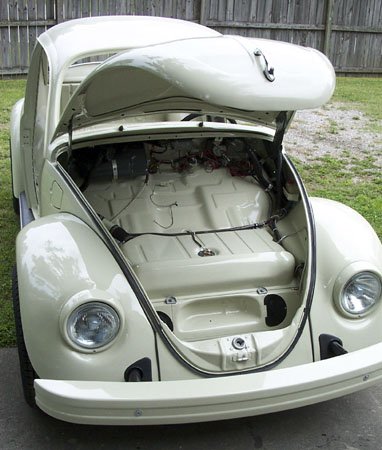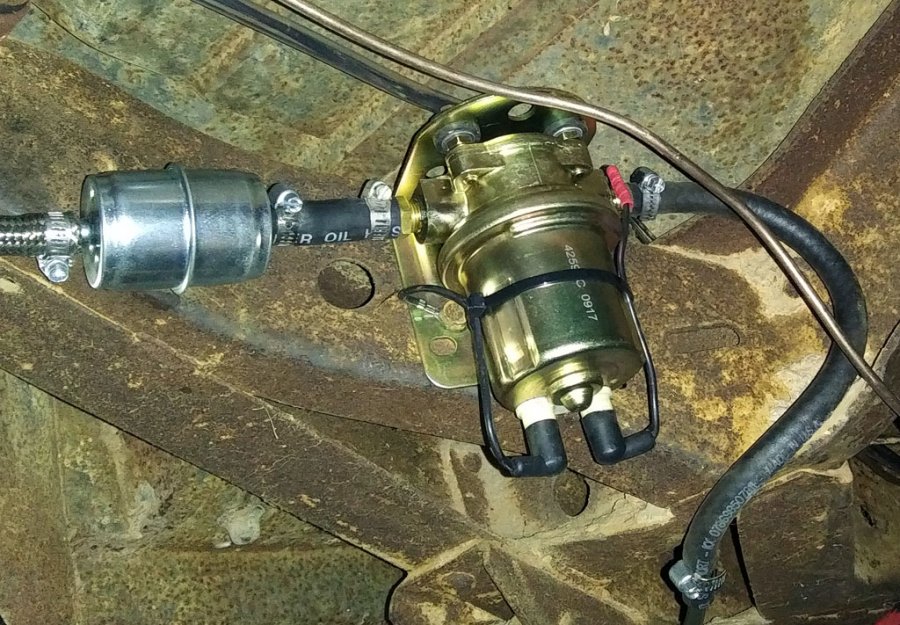-
Posts
2,561 -
Joined
-
Last visited
-
Days Won
83
Everything posted by Sam Buchanan
-

Recommendation for Vent Window Rubber Seals
Sam Buchanan replied to Stargrinder's topic in P15-D24 Forum
My comments were not directed at international shipping. Fortunately here in the USA we have USPS which offers inexpensive shipping with tracking for small parts. I use it frequently with high percentage of reliable results. If it is good enough for a major aircraft supply vendor it should be good enough for a smaller vendor shipping old car bits and pieces. ? -

Recommendation for Vent Window Rubber Seals
Sam Buchanan replied to Stargrinder's topic in P15-D24 Forum
I guess what kinda hacks me off is Bernbaum insisting on shipping a small, light part UPS for $14 when it could be dropped into a padded envelope and shipped priority mail for $3. That is why I consider their shipping fees on small parts to be a "profit tax", it would add up to a huge margin over the course of a month's shipments. No doubt a good business plan for them, but frustrating on our end. -

Recommendation for Vent Window Rubber Seals
Sam Buchanan replied to Stargrinder's topic in P15-D24 Forum
I don't want to vendor bash....but that inflated shipping charge is just a back-handed way to jack up the price of the product. Sorta insults my intelligence.....I've bought quite a bit of stuff from Berbaum but only as a last resort. -

My First Car -- P15 1947 Plymouth Deluxe
Sam Buchanan replied to NickPickToo's topic in P15-D24 Forum
Nick, you won't be able to consistently shoot the new low-VOC paints without orange peel. But there is a remedy. Search YouTube and the internet for "cut and buff" or "color sand". You sand the color with very fine sandpaper until the orange peel is gone then machine buff to a high gloss. The new paints respond very nicely to this procedure, that is how the show-car finishes are done, even with clear coat. Here is an example of a back yard paint job with single-stage PPG Concept that has been sanded and buffed: Yes, when the chrome on the bumpers is shot you can paint them body color for the time being. It's been twelve years since I painted that car and the bumpers are still painted. -
Now you tell me...... ? ?
-
That was my fall-back on the tank in my car. I've built aluminum aircraft fuel tanks from scratch, the P15 tank would be a simple build if original appearance isn't a priority. But a new replacement tank that looks like the old one was readily available so it was a no-brainer after I stuck a camera in the old tank and saw the alien life-forms inhabiting it..... ?
-
No, that was just the tank. I bought a new sender and hose coupling for the filler neck and reused the straps and hardware. Total was less than $475. Your $500 figure is in the ballpark if everything is included. If you buy a new tank pressure test it with a shop vac and soap bubbles....best to find any manufacturing defect before the tank is installed.
-
The actual cost of a new tank is much less than $500 if you take into account the cost of repairing an old tank. The ethanol-contaminated gasoline has changed the equation for new vs repaired. Ethanol is hygroscopic and that is challenging for old tanks. Some of us are biased toward frugality and that is just fine, I tend that direction myself. But the main lesson I learned with my P15 (my first really old vehicle) is that piecemeal repairs are a false economy. I started out trying to replace just the truly bad stuff but never achieved daily reliability until total replacement of brake, fuel and charging systems occurred. I now have a car that can be driven anywhere just as it was intended in 1948....and the money was well-spent. ? (My new tank was $345 from Vans Auto)
-
Keep in mind your tanks were 20 years newer than the old tanks in our cars now (and hadn't been exposed to ethanol)....lots of bad stuff can grow in a tank in twenty years especially if the car has been idle or the tank has old ethanol gas in it.
-
Is it worth $500 to know you will never have a fuel tank problem that could result in a flatbed ride home? ? Disclaimer: My P15 has a new tank, sender, lines, filter, and electric pump. One flatbed ride was enough for me......
-
Kurt, the power for the pump comes off the ignition switch. I put a 10a in-line fuse in the wire right at the switch. The wire penetrates the firewall where the wiring harness goes through then down to the frame rail and back to the pump which is located just forward of the rear axle. The other fuse you see in this photo is for the turn signals.
-

36 Plymouth diff carrier fill plug size
Sam Buchanan replied to n1gzd_plymouth's topic in P15-D24 Forum
3/4" NPT. https://www.engineersedge.com/hardware/taper-pipe-threads.htm -
The load carried by the tires determines how much pressure should be used. A light vehicle won't need as much pressure as a heavy one to provide the tire with proper contact area. The pressure stamped on the sidewall is what is needed for maximum load capacity of the tire which is also stamped on the sidewall. I had 205-50/15 radials on my kit car which had an empty weight of 1500 lbs. I ran 17 psi in the tires for proper contact patch even though "35 psi" was stamped on the sidewalls. My P15 runs with 24 psi in the bias ply tires. The car only weighs 3200 lbs, pumping up the tires to the same pressure (35 psi) as what would be needed for a 4500 lb car is not only unnecessary but unpleasant and may wear the crown of the tread. Hence the recommendation to chalk the tires.....use only as much pressure as needed for proper contact.....and save your achin' back. ?
-
No regulator. I've never measured the pressure of the 6v Carter pump but there are no indications of any pressure issues, the carb seems to be happy.
-
I think you are considering increasing the complexity of the fuel system four-fold. The relay is unnecessary, as is the separator. The inertia switch is a bit controversial, I ran an electric pump in the P15 for a year without the switch, and still have second thoughts about it after I installed it....just something else to fail. Not sure an engine fire is our biggest risk in a car that has no passenger crash protection........ All you need to make your car run nicely is a mechanical fuel pump block-off plate, an electric pump, some wire and a fuse. The other items are wants. ?
-
Is somebody marketing my tool?? I haven't gotten a royalty payment yet.......... The cheap copy you got with the defective nut is what you get with an unauthorized clone.......... ?
-
Then he doesn't know squat.....unless he has eyeballs calibrated to a few thousandths....... ? If the drums are out-of-round you won't be able to get a complete adjustment of the brakes (pedal won't be as high as it could be). I drove my P15 for six months with rear drums that needed turning and after they were turned and the brakes readjusted the pedal was 1.5" higher. Definitely worth the effort.
-

how to simply close my account on this forum....
Sam Buchanan replied to dontknowitall's topic in P15-D24 Forum
Yes....sometimes life points us in a different direction and our priorities must change. Best wishes and thank you for your contributions to the archives. ? -
Looks good.
-
That is pretty clever. ?
-
What are you needing in addition to the files I uploaded? Maybe the little cutouts around the rivets? The files I made should be higher res than something pulled from a photo.
-
A new nut will give you much better results.
-
I still have the brass float, intend to repair it...one of these days. It has a substantial flaw, the repair will add weight. The new float is not solid, it is some sort of plastic and hollow. Here is the link in case anyone needs a new B&B float: https://www.carburetor-parts.com/Carter-Float_p_2998.html
-
Another variable in my case is the installation of an aftermarket float. The brass float sprang a leak so it was replaced with the only float I could find, a composite float from Mike's Carburetors. I don't know if the new float has the same buoyancy as the brass float so the spec measurement of 5/64" may not be optimum. I'll probably try lowering the float some more, the electric fuel pump shouldn't have any problems keeping the bowl full.
-
The reason I'm convinced my car suffers from carb percolation is if I attempt a restart shortly after the hot engine is shut down it will fire immediately. But let the hot engine sit for 15 minutes and it will need to crank for several seconds before it starts. It seems to me a weak coil would make any hot restart difficult. Are you suggesting dropping the float a total of 1/8" or 1/8" lower than spec? I made a float gauge for the standard spec and lowered the float a little more than that but not nearly an 1/8". Maybe I need to lower it some more?







